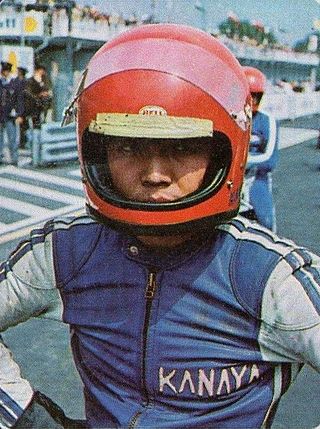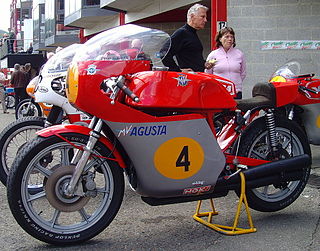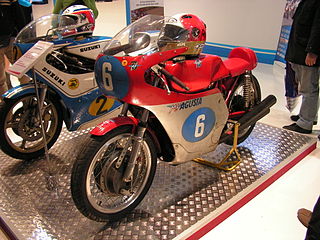
Grand Prix motorcycle racing is the highest class of motorcycle road racing events held on road circuits sanctioned by the Fédération Internationale de Motocyclisme (FIM). Independent motorcycle racing events have been held since the start of the twentieth century and large national events were often given the title Grand Prix. The foundation of the Fédération Internationale de Motocyclisme as the international governing body for motorcycle sport in 1949 provided the opportunity to coordinate rules and regulations in order that selected events could count towards official World Championships. It is the oldest established motorsport world championship.

Stanley Michael Bailey Hailwood, was an English professional motorcycle racer and racing driver. He is regarded by many as one of the greatest racers of all time. He competed in the Grand Prix motorcycle world championships from 1958 to 1967 and in Formula One between 1963 and 1974. Hailwood was known as "Mike The Bike" because of his natural riding ability on motorcycles with a range of engine capacities.

Johnny Alberto Cecotto Persello, better known as Johnny Cecotto, is a Venezuelan former professional Grand Prix motorcycle racer and auto racer. He rose to prominence as a teenage prodigy in 1975 when he became the youngest motorcycle road racing world champion at the age of 19. Despite the auspicious beginning to his motorcycle racing career, he suffered numerous injuries and mechanical problems which curtailed his success in motorcycle Grand Prix racing.

Giacomo Agostini is an Italian former Grand Prix motorcycle road racer. Nicknamed Ago, he amassed 122 Grand Prix wins and 15 World Championship titles. Of these, 68 wins and 8 titles came in the 500 cc class, the rest in the 350 cc class. For these achievements obtained over the course of a career spanning 17 years, the AMA described him as "...perhaps the greatest Grand Prix rider of all time". In 2000, Agostini was inducted into the MotoGP Hall of Fame as a MotoGP Legend, while in 2010, he was named an FIM Legend for his motorcycling achievements.

Randy Mamola is an American former professional motorcycle racer and television sports presenter. He competed in Grand Prix motorcycle racing between 1979 and 1992. A 13-time Premier Class race winner, Mamola was one of the most charismatic Grand Prix road racers of his generation, becoming a favourite because of his interaction with race fans both on and off the track as well as his aggressive and spirited riding style.

Frederick Burdette Spencer, sometimes known by the nickname Fast Freddie, is an American former world champion motorcycle racer. Spencer is regarded as one of the greatest motorcycle racers of the early 1980s.
The 1983 Grand Prix motorcycle racing season was the 35th F.I.M. Road racing World Championship season.
The 1967 Grand Prix motorcycle racing season was the 19th F.I.M. Road Racing World Championship Grand Prix season. The season consisted of thirteen Grand Prix races in six classes: 500cc, 350cc, 250cc, 125cc, 50cc and Sidecars 500cc. It began on 30 April, with Spanish Grand Prix and ended with Japanese Grand Prix on 15 October.

Phillip William Read, was an English professional motorcycle racer. He competed in Grand Prix motorcycle racing from 1961 to 1976. Read is notable for being the first competitor to win world championships in the 125 cc, 250 cc and 500 cc classes. Although he was often overshadowed by his contemporary, Mike Hailwood, he won seven FIM Grand Prix road racing world championships.

The 1964 Grand Prix motorcycle racing season was the 16th F.I.M. Road Racing World Championship Grand Prix season. The season consisted of twelve Grand Prix races in six classes: 500cc, 350cc, 250cc, 125cc, 50cc and Sidecars 500cc. It began on 2 February, with United States Grand Prix and ended with Japanese Grand Prix on 1 November.
The 1965 Grand Prix motorcycle racing season was the 17th F.I.M. Road Racing World Championship Grand Prix season. The season consisted of thirteen Grand Prix races in six classes: 500cc, 350cc, 250cc, 125cc, 50cc and Sidecars 500cc. It began on 21 March, with United States Grand Prix and ended with Japanese Grand Prix on October, 24.
The 1966 Grand Prix motorcycle racing season was the 18th F.I.M. Road Racing World Championship Grand Prix season. The season consisted of twelve Grand Prix races in six classes: 500cc, 350cc, 250cc, 125cc, 50cc and Sidecars 500cc. It began on 8 May, with Spanish Grand Prix and ended with Japanese Grand Prix on 17 October.

Dave Simmonds was a British professional Grand Prix motorcycle road racer. He competed in the Grand Prix world championships from 1963 to 1972. Simmonds is notable for winning the 1969 125 cc FIM road racing world championship.

The 1971 Grand Prix motorcycle racing season was the 23rd F.I.M. Road Racing World Championship Grand Prix season. The season consisted of twelve Grand Prix races in six classes: 500cc, 350cc, 250cc, 125cc, 50cc and Sidecars 500cc. It began on 9 May, with Austrian Grand Prix and ended with Spanish Grand Prix on 26 September.

The 1995 Grand Prix motorcycle racing season was the 47th F.I.M. Road Racing World Championship season.

Hideo Kanaya was a Japanese professional motorcycle racer and motorcycle racing team manager. He competed in the Grand Prix motorcycle road racing world championships from 1967 to 1975. He dominated Japanese road racing in the early 1970s and was the first Japanese rider to win a world championship 500cc Grand Prix race. Although Kanaya was a competitive racer, he was never allowed to compete in a full season in the world championships as, his main responsibility was as a test rider in Japan.

The MV Agusta 500cc Three (1965–1973) or MV Agusta Tre was a road racing motorcycle produced by the Italian manufacturer MV Agusta to compete in the 500 cc Grand Prix motorcycle racing World Championship. The motorcycle was introduced in 1966 to compete against the ever competitive Honda racing machines and was a bored out version of MV Agusta's highly successful 350 cc three cylinder. Giacomo Agostini won consecutive world championships in the 500 cc class with this motorbike from 1966 to 1972. In addition, MV Agusta won the Constructors' World Championships from 1967 to 1972. The MV Agusta Tre is considered the most successful racing motorcycle in history.

The MV Agusta 500cc road racers were motorcycles that the manufacturer MV Agusta built and which were used to compete in 500cc Grand Prix motorcycle racing series between 1950 and 1976. 18 500cc world championship titles were achieved with these machines ridden by John Surtees, Gary Hocking, Mike Hailwood, Giacomo Agostini and Phil Read between 1958 and 1974.

The MV Agusta 350 cc racers were motorcycles produced by MV Agusta between 1954 and 1976 and raced in the 350 cc motorcycle GP championships. 10 world titles were achieved by riders John Surtees, Gary Hocking and Giacomo Agostini on these machines.














